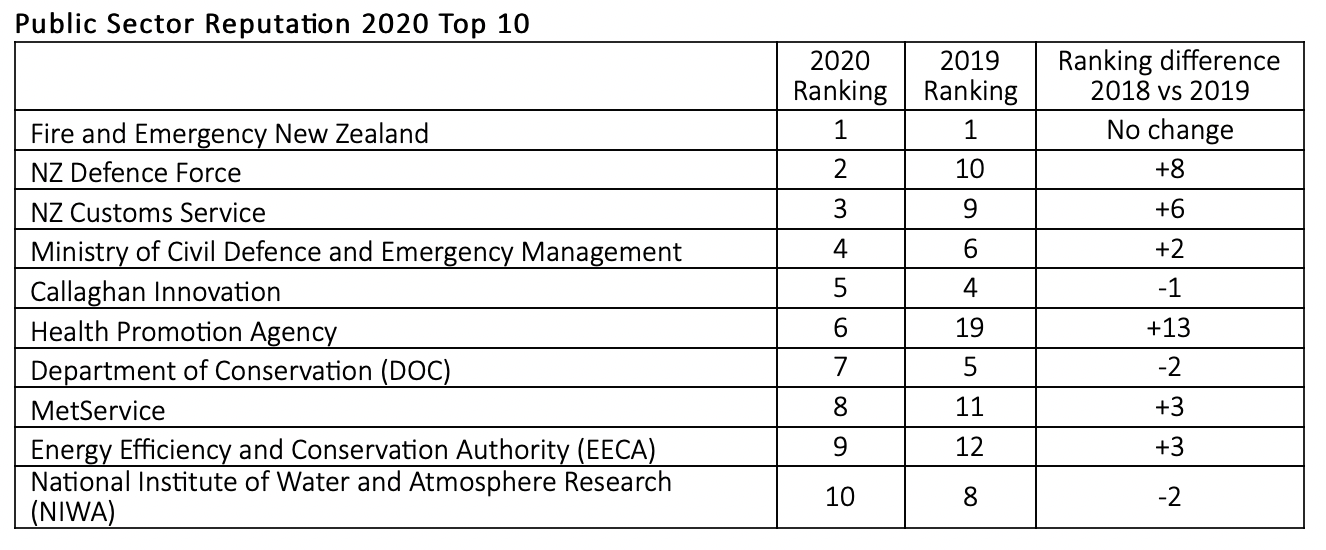27 May 2020
For Colmar Brunton
The reputations of public sector agencies among Kiwis have reached record highs as the COVID-19 crisis has struck according to the Colmar Brunton annual Public Sector Reputation Index released today. The Index measures the reputation of 54 public sector agencies.
Colmar Brunton Research Director, Edward Langley, says the reputation of the public sector has been building gradually in recent years, but this trend has accelerated under COVID-19. For example, the average agency rating for being trustworthy increased from 37% in 2017 to 48% in 2020. At the same time, the average agency rating for being less trustworthy decreased from 17% to 11%.
Fire and Emergency continues to lead the way
Fire and Emergency New Zealand (FENZ) has continued its dominance, taking out the top spot for the fifth year running. It is rated most highly overall, and across each of the four pillars that shape reputation – trust, social responsibility, leadership, and fairness. Rhys Jones, Chief Executive of FENZ, expresses his thanks for the public’s support for the work they do.
“Everyone at Fire and Emergency works hard to do the right thing and support our communities. We are very grateful that this is recognised by the trust and confidence that the public have in us, as it is not something that can be taken for granted. Thank you.
During the COVID-19 pandemic we have seen public sector agencies working together to support communities at an unprecedented time. It is extremely pleasing to see that the increased trust and confidence in the work we collectively do.”
Over the past five years the gap between FENZ and the remaining agencies has narrowed. This is despite FENZ being more highly rated by New Zealanders than in recent years. In other words, perceptions of the rest of the public sector are improving more rapidly.
Key movers in the top 10 ten include the Defence Force and the Customs Service which have climbed the rankings to take second and third place respectively. The biggest mover in the top 10 was the Health Promotion Agency, which moved up 13 places to take sixth position. Customs Chief Executive, Christine Stevenson, says.
“This strong result recognises the hard work of everyone who works at Customs. We are a team of around 1,300 people, all of whom are committed to protecting and promoting New Zealand across borders. Customs staff really do exemplify the spirit of public service, and it’s great to see that recognised in this year’s results. It is also important to acknowledge and recognise the strong support we receive from other public service agencies, especially the other border and law enforcement agencies.”
The research was conducted as the COVID crisis started to hit between 10 and 25 March 2020 and Langley says the strong public sector reputation has supported our successful response to COVID.
“As we entered the crisis, New Zealanders were rating public agencies more highly than in recent years. This means they were more likely to be in listening-mode and prepared to place their trust in those leading our response. This no doubt supported New Zealand’s strategy to eliminate the virus.”
Forging a new relationship with the state
The results provide further evidence of how COVID-19 is prompting New Zealanders to reassess their relationship with the state. A separate Colmar Brunton study showed the public’s trust in the Government to deal successfully with national problems had rocketed from 59%[1] to 86%[2].
“Collectively our research indicates New Zealanders have a new appreciation of the state and its role to tackle key issues. During the financial crisis the state was the lender of last resort. During the COVID crisis it has been the employer of last resort for many. As a result, our trust and confidence has increased in both government and our public agencies. This provides an opportunity to re-engage with the public to tackle some of the key challenges of the next decade, whether that be protecting our environment, supporting wellbeing, or fighting child poverty.”
Delivering outstanding experiences is ever more critical in COVID times
Langley says the Index also identifies a clear risk for the state. The opportunity for agencies to re-invigorate their relationship with citizens could evaporate if they fail to deliver positive experiences at a time of unprecedented demand.
“In 2019, we demonstrated the impact that positive and negative experiences have on the level of advocacy and criticism an agency can expect. These experiences make impressions lasting up to a decade and sometimes longer.
“The economic consequences of the COVID crisis and its impacts on health and wellbeing will likely result in unprecedented demand for services. These experiences will shape the reputation of agencies for years to come. This means it is more important than ever that public agencies are focused on delivering high quality experiences.”


The Colmar Public Sector Reputation Index measures the public reputations of 54 New Zealand public sector agencies based on 2750 online interviews with a nationally representative sample by age, gender, region, ethnicity, and income conducted between 10 and 25 March 2020.
The index uses the global RepZ framework, created by Colmar Brunton’s global parent company Kantar, with standardised reputation attributes of trust, social responsibility, leadership, and fairness.

Give us a call, send us a message or call in and see us. We’d love to hear from you.